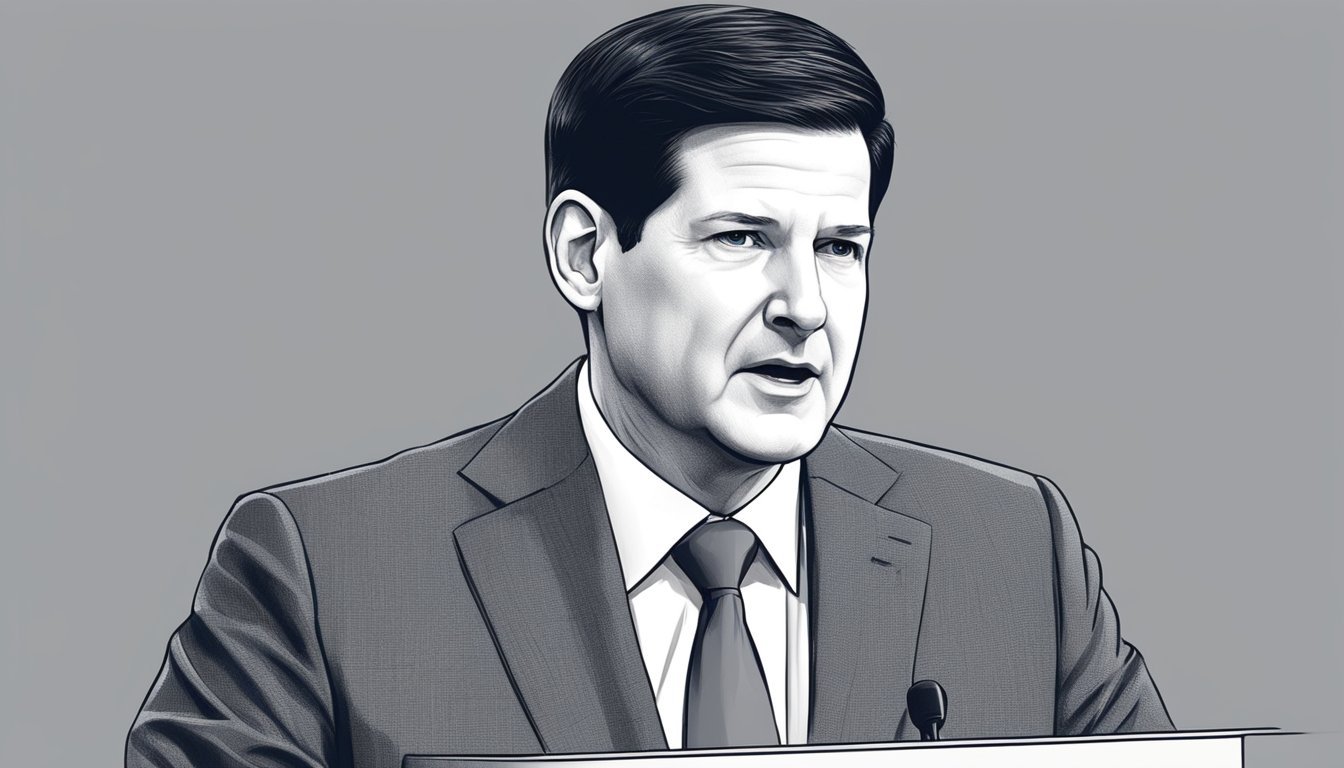Byline Blunders
From Pulitzer-winning frauds to network anchors caught in lies, the world of journalism has seen its share of shocking scandals. Dive into the stories behind the headlines, where reporters became the reported. Explore the fall from grace of media's biggest names and the ripple effects that shook the foundations of trust in news.
Mark Halperin: The Political Journalist Brought Down by #MeToo
Prominent political journalist Mark Halperin's career abruptly ends in October 2017 amid multiple sexual harassment allegations from his time at ABC News. This #MeToo reckoning in media exposes the pervasive nature of workplace misconduct, sparking discussions about power dynamics in journalism and the industry's response to long-standing inappropriate behavior.
Gayle King: The Kobe Question That Sparked Outrage
CBS This Morning co-host Gayle King faces intense backlash after asking WNBA star Lisa Leslie about Kobe Bryant's 2003 sexual assault case in February 2020, just days after his tragic death. The controversial interview question ignites a firestorm on social media, raising debates about journalistic ethics, the treatment of celebrity legacies, and the balance between reporting and sensitivity in the wake of tragedy.
Kaitlan Collins: The White House Ban That Backfired
CNN reporter Kaitlan Collins' July 2018 ban from a White House press event, following tough questions to President Trump, backfires and rallies support for press freedom. This incident, sparked by Collins' inquiries about Michael Cohen, highlights tensions between the administration and media, ultimately drawing more attention to her questions and uniting journalists in defense of First Amendment rights.
Chris Matthews: MSNBC's 'Hardball' Host's Hard Fall
Veteran political commentator Chris Matthews abruptly ends his 23-year run on MSNBC's "Hardball" in March 2020 amid allegations of inappropriate comments. This sudden departure marks the end of an era in political commentary and raises questions about workplace conduct in media, the #MeToo movement's impact on journalism, and the changing landscape of cable news.
Tamron Hall: NBC's Controversial Today Show Shuffle Sparks Industry Debate
Tamron Hall's sudden departure from NBC in 2017, following the cancellation of "Today's Take" in favor of Megyn Kelly's show, ignites industry-wide debate. This controversial Today Show reshuffle raises questions about diversity in morning television, network decision-making, and the treatment of established talent in the competitive world of daytime TV.
Sean Hannity: The Secret Client of Michael Cohen Revealed in Trump Lawyer Scandal
Fox News host Sean Hannity exposed as Michael Cohen's secret client in April 2018, deepening the Trump lawyer scandal. This revelation during a court hearing raised ethical questions about Hannity's undisclosed relationship with Trump's personal attorney, sparking debates on journalistic integrity and potential conflicts of interest in political media coverage.
Don Lemon: CNN's Prime Time Host Faces Sexual Assault Allegations
CNN prime time host Don Lemon faces sexual assault allegations stemming from a 2018 incident in the Hamptons, prompting a network investigation. The lawsuit, filed by bartender Dustin Hice in 2019, accuses Lemon of assault, battery, and intentional infliction of emotional distress, raising questions about accountability in media and the handling of misconduct allegations against high-profile journalists.
Katie Couric: The Deceptive Edit That Tarnished Her Reputation
Katie Couric's reputation suffers after a controversial edit in her 2016 gun violence documentary "Under the Gun" misrepresents gun rights advocates' responses. This media ethics case study examines how deceptive editing practices can undermine journalistic integrity and public trust, sparking debates about responsibility and transparency in documentary filmmaking.
Fareed Zakaria: CNN's Plagiarism Problem Resurfaces Amid New Allegations
CNN host Fareed Zakaria faced serious plagiarism allegations in 2012, reigniting debates about journalistic integrity and intellectual theft in media. Suspended by CNN after admitting to copying from a New Yorker article for his Time column, Zakaria's case highlights the ongoing challenges of maintaining ethical standards in journalism and the consequences of plagiarism in the digital age.
Martin Bashir: The Diana Interview That Haunted the BBC
Martin Bashir's controversial 1995 Panorama interview with Princess Diana, which exposed royal family tensions, led to a major BBC scandal decades later. The groundbreaking televised conversation, revealing intimate details of Diana's marriage to Prince Charles, sparked a subsequent investigation that uncovered unethical practices in securing the interview, tarnishing the BBC's reputation.
Claas Relotius: Der Spiegel's Fabrication Scandal Shakes Journalism's Foundations
Der Spiegel's star reporter Claas Relotius exposed for fabricating articles, triggering a major journalism crisis in December 2018. This scandal revealed systemic failures in fact-checking processes at the renowned German magazine, raising critical questions about journalistic integrity and the vulnerability of modern media to fabrication.
Larry King: CNN Legend's Russian TV Controversy Sparks Media Debate
Legendary CNN host Larry King faces criticism for his controversial move to Russian state-funded network RT, igniting debates about journalistic integrity and international influence in media. King's decision to host shows on RT after his long CNN career raises questions about the ethics of working with state-sponsored media and the potential for foreign influence in journalism.
Gretchen Carlson: The Lawsuit That Brought Down Roger Ailes
Gretchen Carlson's 2016 sexual harassment lawsuit against Fox News CEO Roger Ailes ignited a media firestorm, leading to his resignation and reshaping the network. This landmark case exposed a culture of misconduct at Fox News, sparked a broader conversation about workplace harassment in media, and became a pivotal moment in the #MeToo movement.
Michael Avenatti: From Media Darling to Convicted Felon
Michael Avenatti's rapid rise as Stormy Daniels' lawyer in her case against Donald Trump, followed by his dramatic fall to convicted felon status, offers a cautionary tale of media sensationalism and legal ethics. Once a media darling known for his sharp suits and provocative statements, Avenatti's journey from high-profile attorney to criminal conviction highlights the dangers of unchecked ambition in the legal world.
Laura Ingraham: When Mocking a School Shooting Survivor Backfires
Fox News host Laura Ingraham faces intense backlash after mocking Parkland shooting survivor David Hogg on Twitter in March 2018. Her criticism of the student activist's college rejections sparked widespread condemnation, leading to advertiser boycotts and reigniting debates about media responsibility and the treatment of young activists.
Nate Silver: The Data Journalist Who Got It Wrong
Data journalist Nate Silver's rise and fall at FiveThirtyEight offers a cautionary tale about the limits of predictive analytics in political forecasting. Once hailed for revolutionizing election predictions, Silver's approach faced criticism for misinterpreting polling data and overconfidence in statistical models, challenging the reliability of data-driven political analysis.
Jorge Ramos: Detained in Venezuela for Challenging Maduro
Univision anchor Jorge Ramos and his crew were detained for over two hours in Venezuela's presidential palace after confronting President Nicolas Maduro about the country's humanitarian crisis. The February 2019 incident, where Ramos reportedly called Maduro a "dictator" and "murderer," highlights the risks journalists face when challenging authoritarian regimes.
Tomi Lahren: When Pro-Choice Views Cost a Conservative Her Job
Conservative commentator Tomi Lahren sparks controversy and faces professional consequences after expressing pro-choice views on "The View" in March 2017. Her stance on abortion rights, rooted in limited government beliefs, clashes with conservative orthodoxy, igniting a debate about personal beliefs versus political alignment in punditry.
Bari Weiss: The New York Times Resignation That Went Viral
Bari Weiss's public resignation from The New York Times in July 2020 sparks intense debate on media bias and workplace culture in journalism. The former columnist's accusations of an "illiberal environment" and discrimination at the prestigious newspaper mark a turning point in discussions about media ethics and diversity of thought in newsrooms.
Emily Wilder: When Past Activism Ends a Journalism Career
Emily Wilder's termination from AP News over past pro-Palestinian activism ignites controversy about journalism ethics and social media conduct. The 22-year-old journalist's case raises critical questions about how news organizations should address employees' past political activities and online presence, sparking a broader debate on objectivity in modern journalism.




















